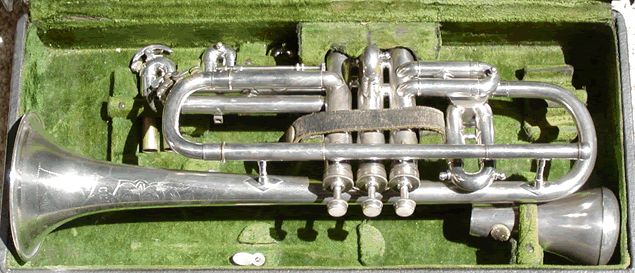Conn 10A Wonder Vocal Cornet in C, Bb and A (LP)

Date: 1921. Owned by John Hensley
The 10A Wonder Vocal Cornet has a #1½ bore, which is 0.458". The extra slides visible in the case are either to tune it to either Bb or C, or to switch between low and high pitch. Since the actual switch between C and Bb/A was made easy by turning a rotor valve at the base of the vertical slide between the first valve and the player, would it make sense to put the player through the hassle of then swapping the valve slides? It is possible that the C/Bb changeover in slides is done by pulling the Bb slides out to a position marked "Bb" on the slide. I am told this wasn't uncommon. If the slides are for C/Bb, then this is a 10A. If those slides are for low/high pitch, then this is an 11A.
The valves on the 10A are top spring with sophisticated guides (quite modern for the day). Back in the 1920's instruments were still made in both "low pitch" (A=440 hz) and "high pitch" (A=452.5 hz). The 10A was the low pitch version, the 11A was high pitch. Apparently the 11A high pitch version was half an inch shorter than the 10A. The 10A Wonder Vocal Cornet was produced between at least 1917 and 1927, and possibly longer. Indications are production started sometime during the 1910's.
I have learned that the third slide without the finger ring to adjust the pitch of a low D and C# is slightly longer than it is on modern instruments. On modern instruments the low Eb is in tune, but the low D and C# are quite sharp. On these older cornets with the longer third slide and no finger ring the Eb is a bit flat and the D and C# are slightly sharp, but not as sharp as they are on later instruments. It was thought that the flat Eb and slightly sharp D and C# were within the abilities of the player to lip into tune.
As far as I can tell at this point, all Conn cornets built before 1958 take a short shank cornet mouthpiece as opposed to the 2¾" "Bach-style" long shank cornet mouthpiece. The long shank cornet mouthpieces won't properly fit a pre-1958 Conn cornet and won't give the proper intonation or playing characteristics of a short shank cornet mouthpiece. All of Conn's "Connstellation" cornet mouthpieces are long shank mouthpieces. The "Improved Precision" Conn mouthpieces such as the Conn 4 are long shank if there is a "ridge" halfway down the shank, and short shank if there is no ridge (in which case it is a "Precision" mouthpiece). All Conn cornet mouthpieces built before the "Improved Precision" series (ridge), such as the "Precision" series (no ridge) are short shank mouthpieces.
What Conn said in 1927:
The Wonder Vocal cornet is the most practical C, Bb and A cornet ever built, not alone because of its ease of
adjustment from C to Bb and A but also for its easy blowing qualities and rich vocal tone when played in C.
It is especially suited for choral and home use, as it plays from piano and song scores without transposition.
When in Bb or A the Wonder Vocal cornet is a fine cornet for work in bands and orchestras.
According to Conn, the Wonder Vocal Cornet has a bell diameter of 4½", is 16½" long, the valve casing is 5½" long and it weighs 2 lbs. 8 oz.